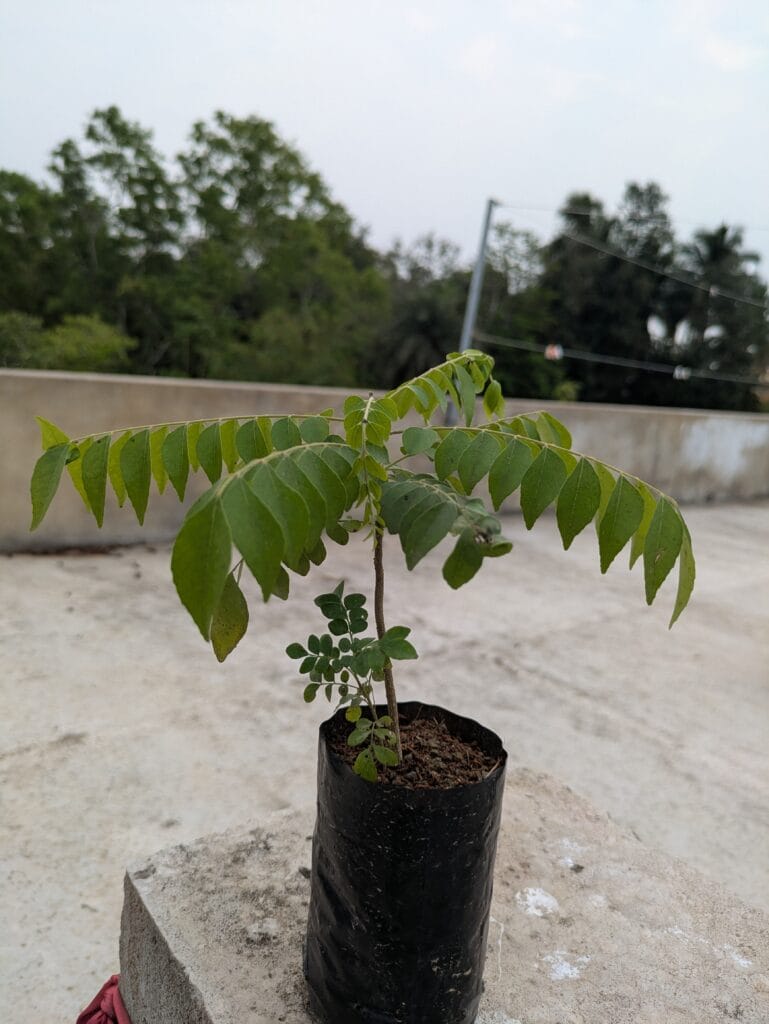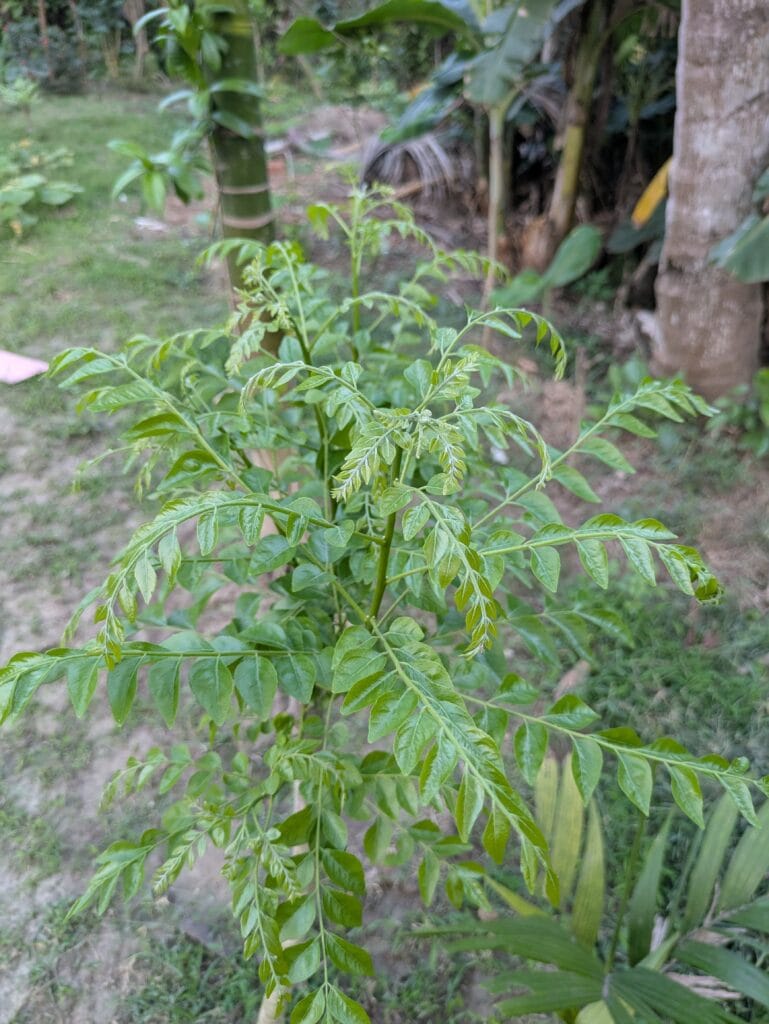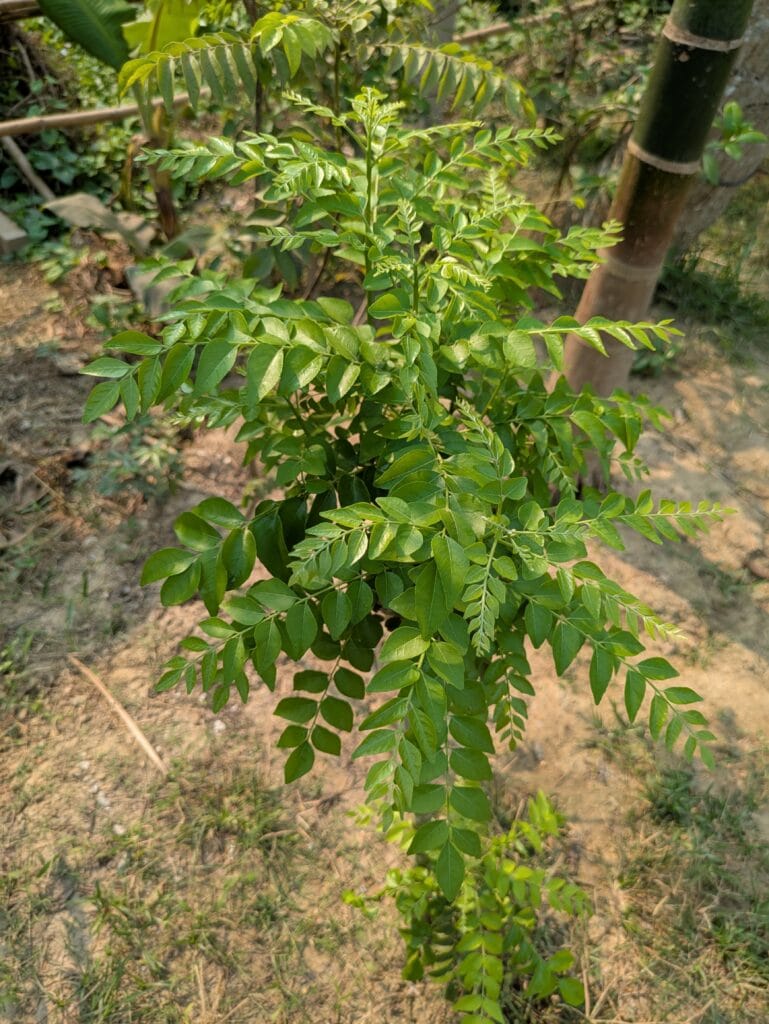Curry leaves are commonly used in Indian cooking, especially in the South, where their aromatic flavor enhances many dishes. Beyond their culinary use, these leaves have an important place in Ayurveda, the ancient Indian system of holistic medicine. Known for their pungent, slightly bitter, and astringent taste, curry leaves are valued for their ability to maintain balance among the body’s doshas—Vata, Pitta, and Kapha. Let’s explore how these Health Benefits of Curry Leaves and well-being.
This post may contain affiliate links. If you make a purchase through these links, i may earn a small commission at no extra cost to you.

Balancing the Doshas: Vata, Pitta, and Kapha
In Ayurveda, achieving balance among the three doshas—Vata (air and space), Pitta (fire and water), and Kapha (earth and water)—is important for good health. Curry leaves are referred to as “tridoshic,” meaning they can help balance all three doshas. However, they are especially helpful for Pitta and Vata imbalances.
For Pitta Dosha: Curry leaves have cooling properties, which help calm aggravated Pitta. High Pitta levels can cause problems like acidity, inflammation, and skin rashes. Consuming curry leaves can help reduce internal heat and provide relief from issues like heartburn and gastritis.
For Vata Dosha: Vata controls movement in the body. When Vata is out of balance, it can lead to symptoms like dryness, constipation, and anxiety. Curry leaves help soothe Vata imbalances by improving digestion and promoting hydration, easing problems like bloating and irregular bowel movements.
For Kapha Dosha: While curry leaves aren’t directly linked to Kapha as much as Pitta and Vata, their stimulating and digestive properties support Kapha-dominant individuals. These people often struggle with sluggish digestion, weight gain, and excessive mucus production. Curry leaves help enhance metabolism, encouraging the breakdown of fats and reducing Kapha-related stagnation.

Digestive Health
Curry leaves are highly regarded in Ayurveda for their ability to support digestion. They are known as “Agni” enhancers, which means they strengthen the digestive fire—essential for good metabolic health. The Health Benefits of Curry Leaves for digestion are vast.
Stimulating Digestion: Curry leaves help promote the secretion of digestive enzymes, which aid in the breakdown of food. This helps prevent indigestion and bloating while ensuring better nutrient absorption.
Relieving Constipation: With mild laxative properties, curry leaves stimulate peristalsis (the natural contractions of the digestive tract). Regular consumption helps relieve constipation and promotes smooth bowel movements.
Detoxification: The antioxidant properties of curry leaves help eliminate toxins (Ama) from the digestive system, contributing to better gut health and improved immunity. The Health Benefits of Curry Leaves extend to the detoxification process as well.

Blood Sugar Regulation
In Ayurveda, curry leaves are known to help manage “Prameha,” a term used to describe conditions related to excessive urination and blood sugar imbalances, such as diabetes. The Health Benefits of Curry Leaves also include regulating blood sugar levels.
Regulating Blood Sugar: Curry leaves improve insulin sensitivity and help regulate glucose metabolism, making them a useful addition to the diet for people with Type 2 diabetes. Modern scientific studies have also supported their ability to control blood sugar levels.
Reducing Insulin Resistance: The alkaloids in curry leaves, such as murrayanine, help reduce insulin resistance, making them a natural option for managing blood sugar without solely relying on medication.
Hair Health
Curry leaves are a well-known remedy for promoting hair growth and treating hair-related issues. They are considered rejuvenating herbs that support vitality and longevity. The Health Benefits of Curry Leaves for hair growth and health are significant.
Strengthening Hair Follicles: Rich in vitamins A and C, iron, and other nutrients, curry leaves nourish hair follicles, resulting in stronger, healthier hair. They also prevent premature graying by maintaining the natural color of the hair.
Reducing Dandruff and Hair Fall: Curry leaves have antibacterial and antifungal properties, making them effective against scalp infections and dandruff. Massaging the scalp with curry leaf-infused oil helps reduce hair fall and improve scalp health.
Promoting Hair Growth: Using curry leaves in hair masks or oils can stimulate dormant hair follicles, encouraging the growth of new hair. This makes them a natural remedy for thinning hair and bald patches.

Liver Health and Detoxification
The liver is the body’s main organ for detoxifying and metabolizing nutrients. Curry leaves are considered hepatoprotective, meaning they help protect the liver from damage and improve its function. The Health Benefits of Curry Leaves also include liver detoxification.
Enhancing Liver Function: Curry leaves support detoxification by neutralizing toxins and promoting the health of liver cells. This makes them useful for conditions like fatty liver disease, jaundice, and hepatitis.
Boosting Bile Production: Ayurvedic practitioners often recommend curry leaves to stimulate bile production, which is important for digesting fats and absorbing fat-soluble vitamins such as A, D, E, and K.
Antioxidant and Anti-inflammatory Properties
Curry leaves are packed with antioxidants, which protect the body from oxidative stress caused by free radicals. Oxidative stress contributes to aging and chronic diseases. The Health Benefits of Curry Leaves include their anti-inflammatory properties.
Reducing Inflammation: Chronic inflammation is linked to many health issues, including arthritis, heart disease, and diabetes. The flavonoids and alkaloids in curry leaves have anti-inflammatory effects, which help alleviate joint pain and other inflammatory conditions.
Cancer Prevention: Although more research is needed, some studies suggest that the antioxidants in curry leaves may help prevent certain cancers by neutralizing harmful free radicals and inhibiting cancer cell growth.

Skin Health
Curry leaves are known for their purifying properties in Ayurveda, helping cleanse the body and improve skin health. Their sattvic (pure) nature rejuvenates the skin, leading to a clearer, glowing complexion. The Health Benefits of Curry Leaves extend to improving skin conditions as well.
Treating Acne and Pimples: With their antibacterial and antifungal properties, curry leaves can help treat acne and pimples. They are often used in face masks or pastes to reduce skin inflammation and cleanse pores.
Preventing Premature Aging: Curry leaves are rich in antioxidants that protect the skin from damage caused by free radicals. They help slow down the aging process by supporting collagen production, which keeps the skin firm and youthful.
Improving Memory and Cognitive Function
Curry leaves are also known for their brain-boosting properties in Ayurveda. They are believed to enhance mental clarity, focus, and memory, making them an important herb for cognitive health. The Health Benefits of Curry Leaves include improved brain function.
Boosting Brain Function: Curry leaves stimulate the nervous system and improve cognitive function. Regular consumption can enhance both short-term and long-term memory.
Protecting Brain Cells: The antioxidants in curry leaves protect brain cells from oxidative stress, which can reduce the risk of neurodegenerative diseases such as Alzheimer’s and Parkinson’s.
Practical Ways to Use Curry Leaves
There are many ways to incorporate curry leaves into your daily routine:
Cooking: Add fresh curry leaves to soups, stews, and stir-fries for extra flavor and health benefits.
Teas: Boil curry leaves in water to make a soothing tea that helps digestion and detoxification.
Hair Oil: Infuse coconut or sesame oil with curry leaves to create a nourishing hair treatment.
Face Packs: Grind curry leaves into a paste and mix with yogurt or honey to create a natural face mask for glowing skin.
Conclusion
Curry leaves are more than just a flavorful addition to your meals. Rooted in Ayurveda, these leaves offer a wide range of health benefits, from improving digestion and balancing blood sugar levels to promoting hair growth and enhancing skin health. Their tridoshic nature makes them suitable for almost everyone, and their versatility allows for easy incorporation into daily life. Whether consumed fresh, dried, or as an oil, curry leaves can be a simple yet powerful way to support overall health and well-being. Adding these Ayurvedic treasures to your routine may bring noticeable improvements to your vitality and quality of life.







